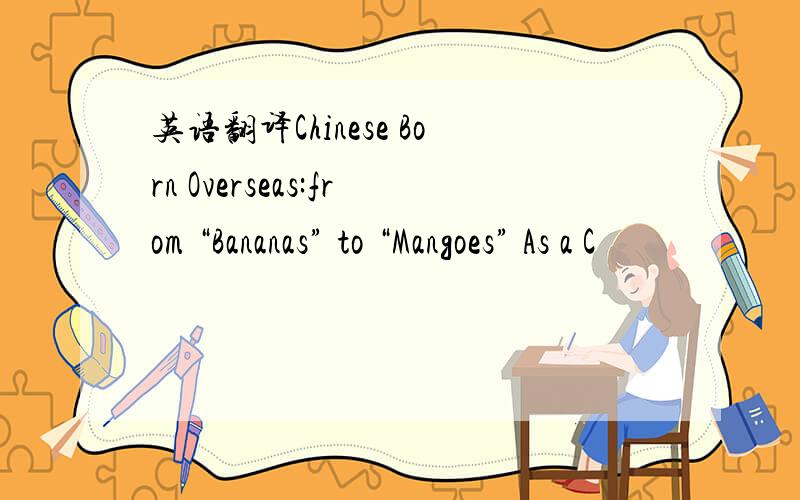英语翻译Chinese Born Overseas:from “Bananas” to “Mangoes” As a C
来源:学生作业帮 编辑:神马作文网作业帮 分类:英语作业 时间:2024/11/18 06:27:32
英语翻译
Chinese Born Overseas:from “Bananas” to “Mangoes”
As a Chinese born and raised in Australia,my identity has always been something of a cultural conundrum.On the one hand,I eat rice,watch Chinese kung-fu films and speak “Chinglish” (a combination of Chinese and English) with my parents.On the other,English is my first language and I love the sun,surf and sand as much as any Australian.
It is a situation common for the 40 million people of Chinese descent that are born overseas.Nicknamed “bananas” (“yellow” on the outside and “white” on the inside),we grow up embracing Western ideals and assimilating to the Western culture.We try to forget the countless Saturdays spent in Chinese school and the family lunches at Chinese restaurants eating things that our Western friends don’t eat.
But why are more and more of us packing our bags and flocking to China?
Perhaps it’s because of China’s increasing prominence in the world,or perhaps we are encouraged by a growing economy and a large number of influential sporting and entertainment icons.Last year,in my travels to China,I met so many “bananas” from all over the world — America,Germany,Switzerland,France — all of whom had come to China and developed,as I have,a strong sense of belonging (归属感) to a culture so unique and vibrant.Far from being “white” on the inside,many of us have developed a greater appreciation of our Chinese identity,so much so that many “bananas” are gradually changing into “mangoes” (“yellow” on the outside and “yellow” on the inside) and turning our Western friends into “eggs” (“white” on the outside and “yellow” on the inside).
“Bananas,” “mangoes” and “eggs” aside,being part of a country with such a long and colourful history is something to be proud of.And while I still love Australia’s surf,sun and sand,there remains a part of me that is Chinese and a deep connection that will always draw me back to China.
Chinese Born Overseas:from “Bananas” to “Mangoes”
As a Chinese born and raised in Australia,my identity has always been something of a cultural conundrum.On the one hand,I eat rice,watch Chinese kung-fu films and speak “Chinglish” (a combination of Chinese and English) with my parents.On the other,English is my first language and I love the sun,surf and sand as much as any Australian.
It is a situation common for the 40 million people of Chinese descent that are born overseas.Nicknamed “bananas” (“yellow” on the outside and “white” on the inside),we grow up embracing Western ideals and assimilating to the Western culture.We try to forget the countless Saturdays spent in Chinese school and the family lunches at Chinese restaurants eating things that our Western friends don’t eat.
But why are more and more of us packing our bags and flocking to China?
Perhaps it’s because of China’s increasing prominence in the world,or perhaps we are encouraged by a growing economy and a large number of influential sporting and entertainment icons.Last year,in my travels to China,I met so many “bananas” from all over the world — America,Germany,Switzerland,France — all of whom had come to China and developed,as I have,a strong sense of belonging (归属感) to a culture so unique and vibrant.Far from being “white” on the inside,many of us have developed a greater appreciation of our Chinese identity,so much so that many “bananas” are gradually changing into “mangoes” (“yellow” on the outside and “yellow” on the inside) and turning our Western friends into “eggs” (“white” on the outside and “yellow” on the inside).
“Bananas,” “mangoes” and “eggs” aside,being part of a country with such a long and colourful history is something to be proud of.And while I still love Australia’s surf,sun and sand,there remains a part of me that is Chinese and a deep connection that will always draw me back to China.

作为一个在澳大利亚出生和长大的中国人,我的身份问题始终是一个难以解释的文化难题.一方面,我吃米饭,看中国功夫电影,并和父母说“Chinglish”(中文和英文混合的语言).另一方面,英语是我的第一语言.我和任何一位澳大利亚人一样热爱阳光、海浪和沙滩.
这是一个在4千万海外生活的具有中国血统的人群中一个普遍存在的现象.被戏称为“香蕉”(意为外“黄”内“白”)的我们,在信奉西方式理想和吸收西方文化的环境中长大.我们试图忘记在中国学校中度过的无数的星期六和在中式餐馆吃着西方朋友不会去吃的食物的家庭午餐.
但我们中为什么越来越多的人收拾行囊涌向中国?
也许是因为中国在世界上不断创造的显著成就,或者也许是被增长的经济和大量的体育界和娱乐业的明星偶像所吸引.去年,在中国的旅行中,我遇到了如此多从世界各地来到中国的“香蕉”们-美国、德国、瑞士、法国-所有这些来到了中国的人和我一样,对如此独特和充满活力的文化生发出强烈的归属感.远离了内在的“白”,我们许多人由衷地感谢自己作为中国人的身份.这种感受如此强烈,以致于许多的“香蕉”开始慢慢地转变为“芒果”(内外皆“黄”),并且将我们的西方朋友转变成了“鸡蛋”(内“白”外“黄”)
“香蕉”、“芒果”和“鸡蛋”一起成为拥有悠久和丰富多彩历史的国家的一部分是一件令人自豪的事情.并且当我依然热爱澳大利亚的海浪、阳光和沙滩时,中国人和这条总会把我带回中国的坚实纽带也成为我生命中不可分割的一部分.
这是一个在4千万海外生活的具有中国血统的人群中一个普遍存在的现象.被戏称为“香蕉”(意为外“黄”内“白”)的我们,在信奉西方式理想和吸收西方文化的环境中长大.我们试图忘记在中国学校中度过的无数的星期六和在中式餐馆吃着西方朋友不会去吃的食物的家庭午餐.
但我们中为什么越来越多的人收拾行囊涌向中国?
也许是因为中国在世界上不断创造的显著成就,或者也许是被增长的经济和大量的体育界和娱乐业的明星偶像所吸引.去年,在中国的旅行中,我遇到了如此多从世界各地来到中国的“香蕉”们-美国、德国、瑞士、法国-所有这些来到了中国的人和我一样,对如此独特和充满活力的文化生发出强烈的归属感.远离了内在的“白”,我们许多人由衷地感谢自己作为中国人的身份.这种感受如此强烈,以致于许多的“香蕉”开始慢慢地转变为“芒果”(内外皆“黄”),并且将我们的西方朋友转变成了“鸡蛋”(内“白”外“黄”)
“香蕉”、“芒果”和“鸡蛋”一起成为拥有悠久和丰富多彩历史的国家的一部分是一件令人自豪的事情.并且当我依然热爱澳大利亚的海浪、阳光和沙滩时,中国人和这条总会把我带回中国的坚实纽带也成为我生命中不可分割的一部分.
英语翻译Chinese Born Overseas:from “Bananas” to “Mangoes” As a C
英语翻译overseas from coast to coast find a place i love the mos
As a Chinese born American是什么意思
it is nice to knew you from the magazine"overseas chinese".错
英语翻译have sb here with us to meet Chinese and overseas media
overseas from coast to coast怎么造句?
英语翻译My first overseas trip was from New York to Paris.I firs
英语翻译Wang Yani was born in 1975.Even as a baby she loved to d
英语翻译I am a 1985 born male from London and would like to lear
英语翻译The Monkey King was born from a stone.Hewanted to live f
英语翻译《more chinese students studying overseas》BEIJING,Oct.16
Overseas Chinese是什么意思